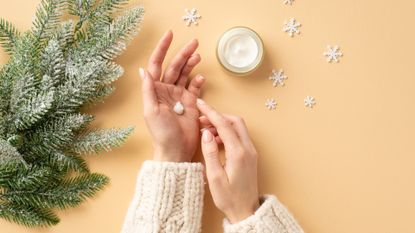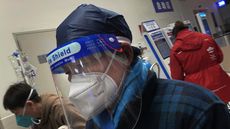4 tips for protecting your skin during winter
The temperature drop could make anyone susceptible to dryer skin. Time to switch up your skin care routine.


Between the temperature dropping outside and the heat being cranked up indoors, the seasonal battle against dry skin has begun. Keeping your skin moisturized is essential year-round, but the dry fall and winter air make doing so especially difficult this time of year.
Your skin's job is to "keep the inside world in and the outside world out," Dr. Brittany Craiglow, dermatologist and associate adjunct professor of dermatology at the Yale School of Medicine, told The New York Times. The lipid barrier, the outermost layer of skin composed of fatty compounds, helps keep hydration and germs and toxins out. When the air gets drier, moisture is pulled from that layer, impairing skin cell turnover and leading to dry and flaky skin, Dr. Craiglow noted.
While some people, like older adults and people with eczema, are prone to dryer skin, it can happen to anyone. But with these four expert tips on protecting your skin from the colder weather, you up your chances of keeping your skin moisturized and content.
Subscribe to The Week
Escape your echo chamber. Get the facts behind the news, plus analysis from multiple perspectives.

Sign up for The Week's Free Newsletters
From our morning news briefing to a weekly Good News Newsletter, get the best of The Week delivered directly to your inbox.
From our morning news briefing to a weekly Good News Newsletter, get the best of The Week delivered directly to your inbox.
Skip the long, hot shower
The winter is not the best time to take long hot showers, even though that might seem counterintuitive. Hot showers strip oil from your skin and so can some fragranced cleansers. Experts recommend switching to shorter, cooler showers with fragrance-free soap. Lukewarm showers might sound like the last thing you want on a cold night, "but it's something to keep in mind if you’re having an eczema flare or your skin is super dry," Dr. Craiglow noted. Your shower temperature "should be what you would imagine a heated pool to feel like in the summertime," Dr. Joshua Zeichner, an associate professor of dermatology and the director of Cosmetic and Clinical Research in Dermatology at Mount Sinai Hospital, told Health.
The thicker the moisturizer, the better
Once you get out of the shower, using a moisturizer on your face and skin while you are still damp is best. Boring is ideal when choosing a moisturizer. "The more bland, the better," Craiglow said. Again, avoiding fragrances and preservatives such as parabens or methylisothiazolinone is optimal since they can irritate already dry skin. Instead, she recommends brands such as Aquaphor, Cetaphil, CeraVe and Vanicream, per the Times. Thick, "occlusive" products like petroleum jelly help create a physical barrier that acts as a sealant and is the best bet for the season. If, however, you would rather use a cream or lotion in place of a heavier moisturizer, that's better than nothing, Dr. Jeffrey Weinberg, a clinical professor of dermatology at the Icahn School of Medicine at Mount Sinai, told the Times. "A cream you use is better than an ointment you don't use."
The American Academy of Dermatology recommends products with these ingredients for people with dry skin: jojoba or mineral oil, dimethicone, glycerin, hyaluronic or lactic acid, lanolin, petrolatum and shea butter.
Add a humidifier
Decreased air humidity contributes to dry skin, so now is a good time to swap out your dehumidifier for a humidifier in your home or workspace. Humidifiers can help recirculate moisture in indoor environments, such as buildings with dry heat. "Just make sure you clean it out and change the water every day — humidifiers can be a great place for bacteria to grow," Dr. Weinberg told the Times.
Be patient with your skin
If you're already struggling with really dry or cracked skin, you may have broken your skin barrier, which would take weeks or months to heal, Dr. Shasa Hu, associate professor in the department of dermatology and cutaneous surgery at the University of Miami Miller School of Medicine, told Today. "It takes at least three to four weeks for that skin barrier to fully repair, so start early," she said.
If you already have a skin condition like eczema, psoriasis or rosacea or you're just looking for guidance, don't hesitate to contact a dermatologist, Dr. Shari Lipner, associate professor of clinical dermatology at the Weill Cornell Medical Center, told TODAY. "If you have any of these conditions, it's a great time to check in to make sure the winter is not causing havoc on your skin," Lipner added, noting that telemedicine would work well for this.

Continue reading for free
We hope you're enjoying The Week's refreshingly open-minded journalism.
Subscribed to The Week? Register your account with the same email as your subscription.
Sign up to our 10 Things You Need to Know Today newsletter
A free daily digest of the biggest news stories of the day - and the best features from our website
Theara Coleman has worked as a staff writer at The Week since September 2022. She frequently writes about technology, education, literature and general news. She was previously a contributing writer and assistant editor at Honeysuckle Magazine, where she covered racial politics and cannabis industry news.
-
 Florida GOP chair says prurient sex and rape allegations won't force him out
Florida GOP chair says prurient sex and rape allegations won't force him outSpeed Read Republicans are calling on Christian Ziegler, half of a Florida GOP power couple, to step down after a police report revealed a sexual battery allegation and a consensual threesome
By Peter Weber, The Week US Published
-
 Dr Bush wins mullet of the year contest
Dr Bush wins mullet of the year contestTall Tales And other stories from the stranger side of life
By Chas Newkey-Burden, The Week UK Published
-
 Crossword: December 4, 2023
Crossword: December 4, 2023The Week's daily crossword
By The Week Staff Published
-
 China's pneumonia cases: should we be worried?
China's pneumonia cases: should we be worried?The Explainer Experts warn against pushing 'pandemic panic button' following outbreak of respiratory illness
By Keumars Afifi-Sabet, The Week UK Published
-
 How polysubstance abuse is worsening the American opioid crisis
How polysubstance abuse is worsening the American opioid crisisThe Explainer Studies are showing that more Americans are struggling with dependency on multiple substances.
By Theara Coleman, The Week US Published
-
 Kush: the drug destroying young lives in West Africa
Kush: the drug destroying young lives in West AfricaThe Explainer There has been a sharp rise in young addicts in Sierra Leone, Guinea and Liberia
By Flora Neville, The Week UK Published
-
 Magic mushrooms and the mind
Magic mushrooms and the mindThe Explainer A growing number of states and cities are legalizing the use of psychedelic fungi in therapy. Some experts think that’s a big risk.
By The Week US Published
-
 Why infant mortality is rising
Why infant mortality is risingThe Explainer The infant mortality rate recently rose for the first time in two decades
By Devika Rao, The Week US Published
-
 What's the microbiome and why is it so important?
What's the microbiome and why is it so important?The Explainer Our bodies serve as vibrant ecosystems for trillions of microbes
By Devika Rao, The Week US Published
-
 5 tips for dealing with grief during the holiday season
5 tips for dealing with grief during the holiday seasonThe Explainer Finding your holiday cheer might be more complicated when you're grieving. But it's not impossible.
By Theara Coleman, The Week US Published
-
 The CDC has a new plan to address the health care worker burnout crisis
The CDC has a new plan to address the health care worker burnout crisisThe Explainer The program puts the pressure on health care leaders to lift some of the burdens of their employees
By Theara Coleman, The Week US Published










